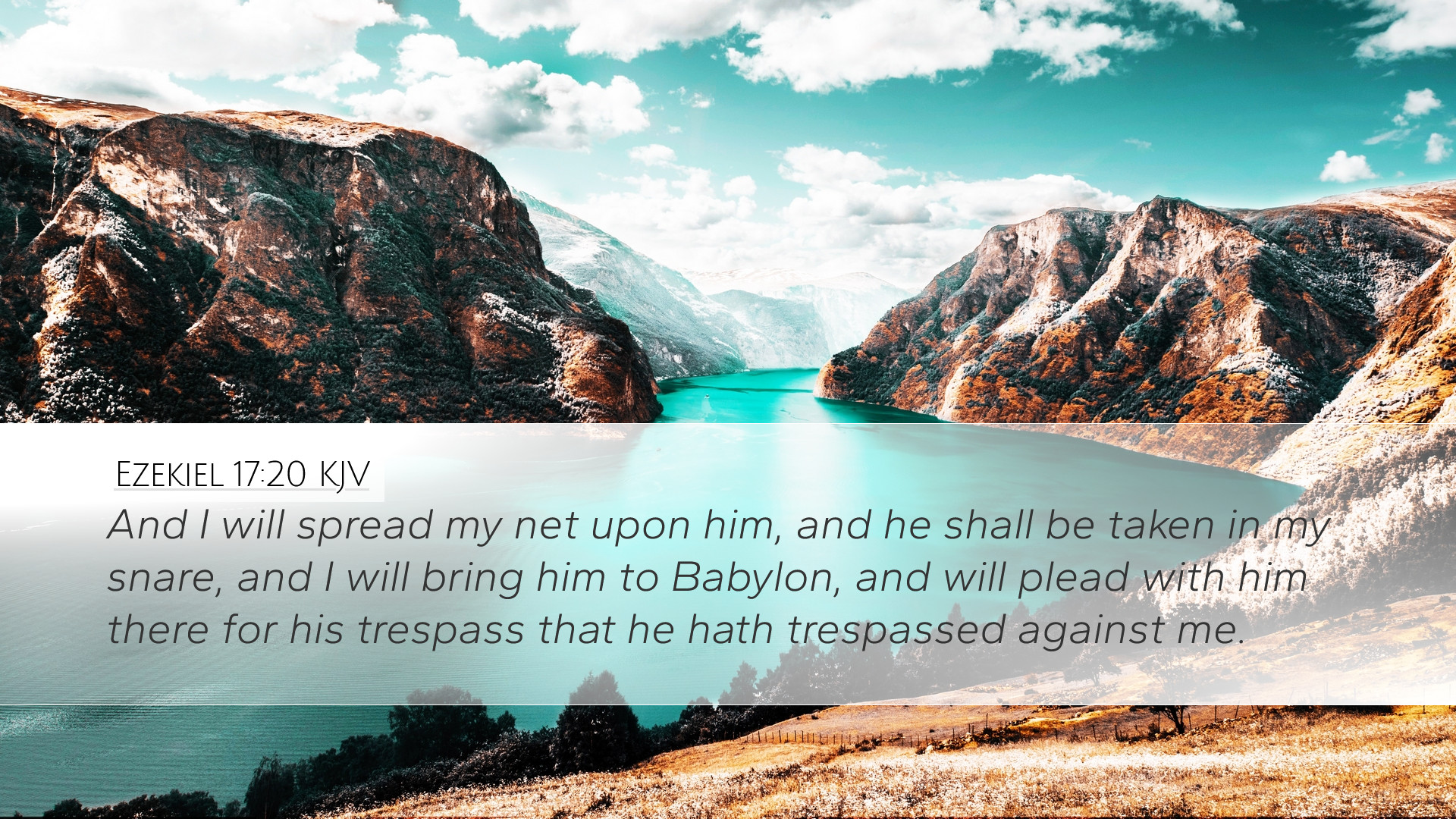Bible Commentary on Ezekiel 17:20
Ezekiel 17:20: "And I will spread my net upon him, and he shall be taken in my snare: and I will bring him to Babylon, and will plead with him there for his trespass that he hath trespassed against me."
Introduction
The verse from Ezekiel 17:20 encapsulates God's judgment and the rationale behind His actions against Israel’s disobedience. In this commentary, we draw from respected public domain sources like Matthew Henry, Albert Barnes, and Adam Clarke to unpack the profound meanings embedded within this verse for pastors, students, theologians, and scholars.
Contextual Background
To fully appreciate the intensity of Ezekiel 17:20, one must consider the surrounding context of the passage. Ezekiel, a prophet during Israel’s exile, uses various metaphors throughout the chapter to illustrate God’s relationship with His people and the consequences of their unfaithfulness. The parable of the two eagles and a vine illustrates how Israel has turned away from God.
Matthew Henry's Insights
Matthew Henry emphasizes the sovereignty of God in judgment. He observes that the metaphor of the "net" signifies that God controls the circumstances that lead to the capture of the disobedient people. In this act, God is not only asserting His authority but also demonstrating His intention to confront sin directly.
Albert Barnes’ Commentary
Albert Barnes elaborates that the "snare" refers to the inevitable consequences of their rebellion, highlighting a divine orchestration that leads to judgment. This judgment is not merely punitive but serves a redemptive purpose, aimed at calling Israel to repentance. Barnes underscores the seriousness of transgression against God and illustrates how God's plea for righteousness persists even in judgment.
Adam Clarke's Perspective
Adam Clarke provides a nuanced interpretation of the phrase "plead with him there for his trespass." He asserts that this represents God's desire for reconciliation. Clarke notes that God's judgment is also an invitation for the offender to turn back to Him, indicating that even in His wrath, mercy prevails. Thus, the 'going to Babylon' represents a pathway to restoration through the acknowledgment of sin.
Theological Implications
This verse presents significant theological implications regarding God’s nature as both just and merciful. It confronts the duality of God’s character in dealing with sin, emphasizing that while He punishes wrongdoings, He also earnestly desires repentance and reconciliation.
Divine Sovereignty and Human Accountability
This scripture illustrates the tension between divine sovereignty and human free will. As highlighted by the commentators, despite God's orchestration of events leading to exile, Israel still bears the responsibility for its choices. This serves as a reminder for contemporary believers regarding the importance of faithfulness to God's calling, as described in:
- Romans 14:12: "So then each of us will give an account of himself to God."
- Galatians 6:7: "For whatever a man sows, that he will also reap."
The Call to Repentance
The plea for restoration highlights God's desire to redeem His people. The verse illustrates that judgment is not the end; rather, it serves as a crucial step towards reconciliation. All three commentators agree that the ultimate goal of God's actions is to draw His people back into right relationship with Him.
Practical Applications
For pastors and theologians, Ezekiel 17:20 presents rich material for sermons and teachings about God’s justice and mercy. Key takeaways include:
- The Assurance of God’s Sovereignty: In times of distress or judgment, believers can trust in God's overarching control and purpose.
- The Necessity of Repentance: Just as Israel was called to repentance, so too are believers today. Recognizing one's transgressions and seeking God's forgiveness is essential for spiritual health.
- God’s Compassion: Even in judgment, God extends a call to redemption, reminding each believer of the importance of mercy in their interactions with others.
Conclusion
Ezekiel 17:20 serves as a profound reminder of the complexities of God’s character, encompassing both justice and mercy. The insights of Matthew Henry, Albert Barnes, and Adam Clarke collectively enhance our understanding of this passage, providing a solid theological foundation for further reflection and application in the lives of believers. As we heed this verse, may our hearts remain open to God's corrective hand, leading us ever closer to Him.


